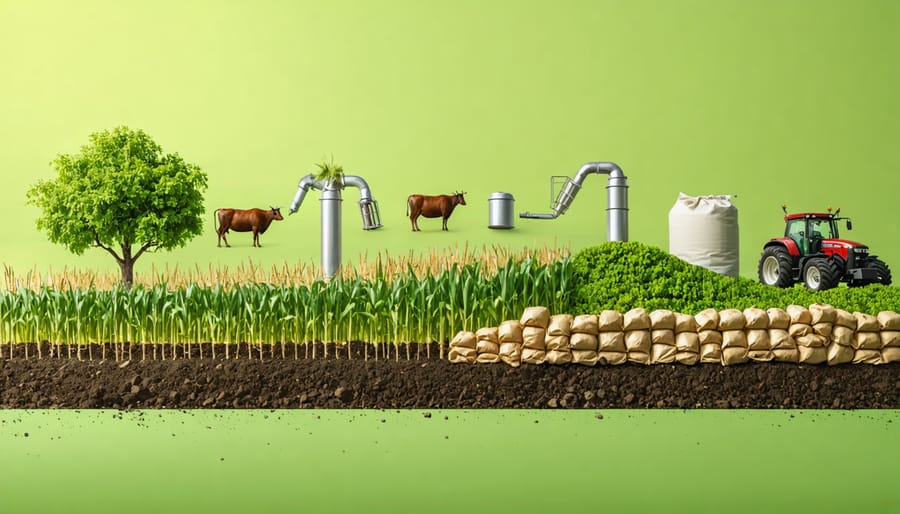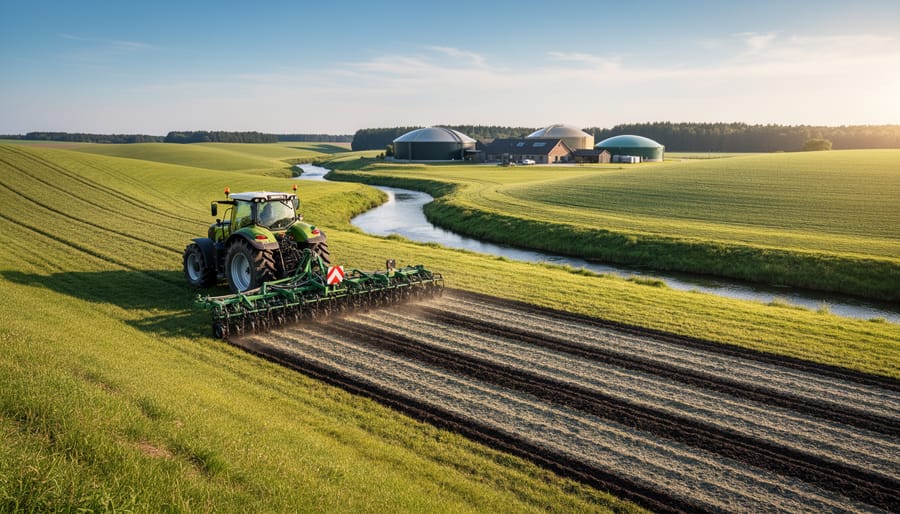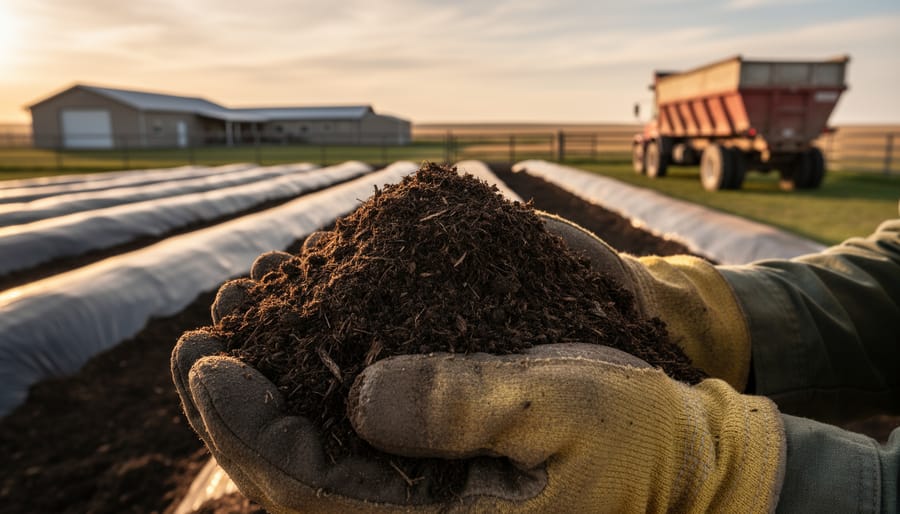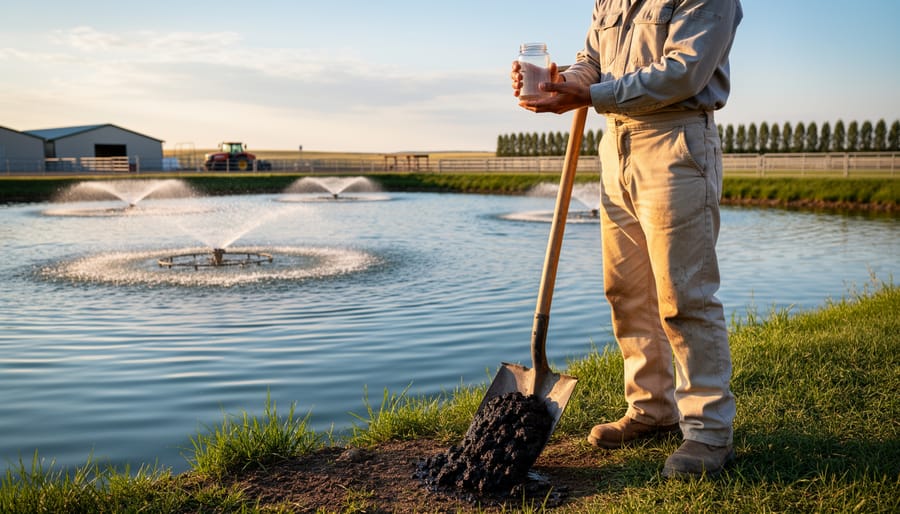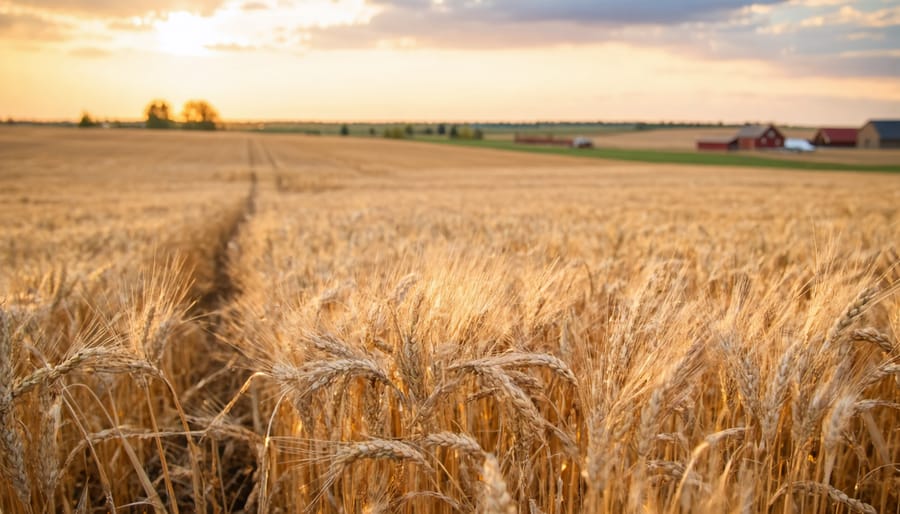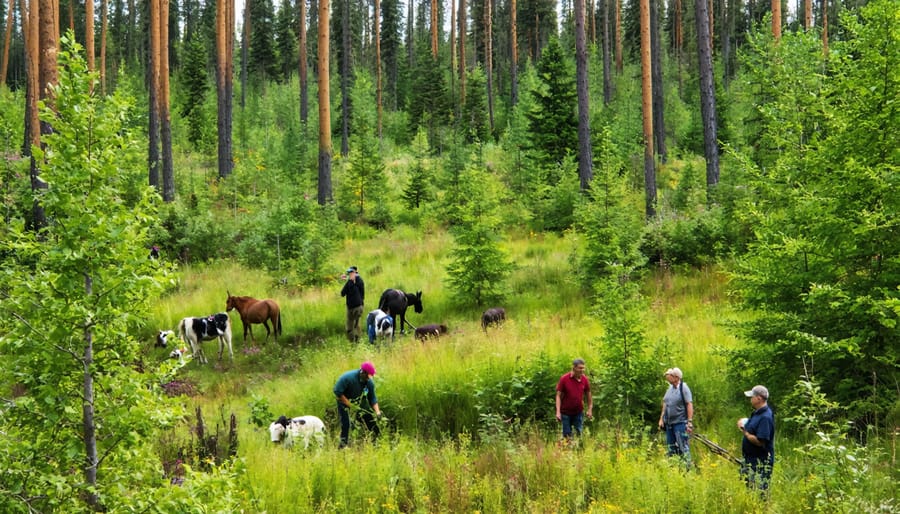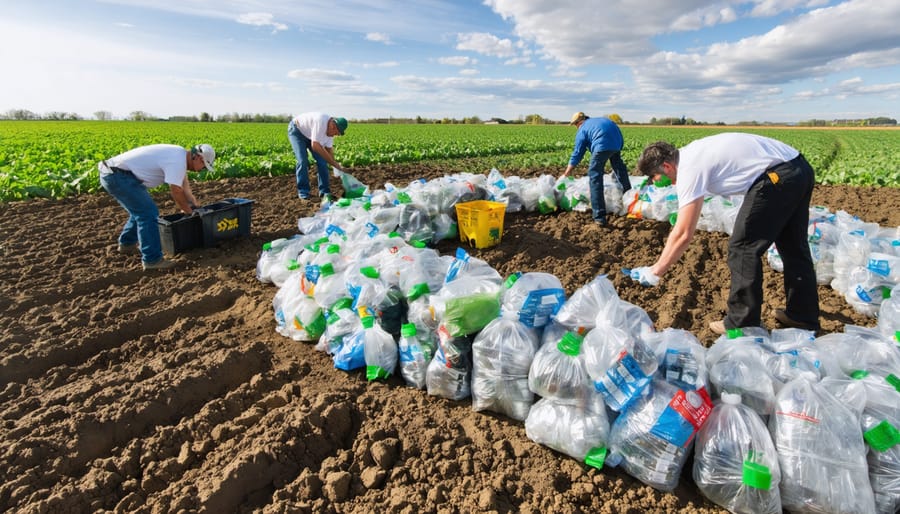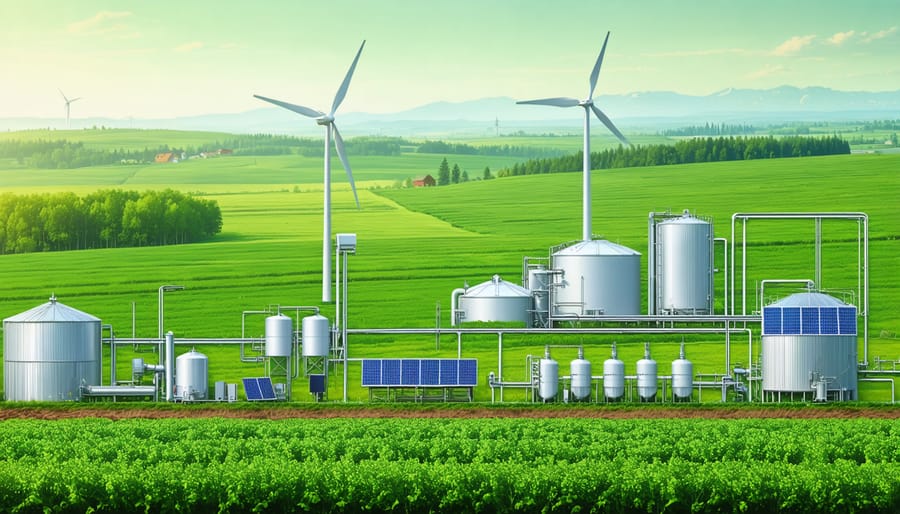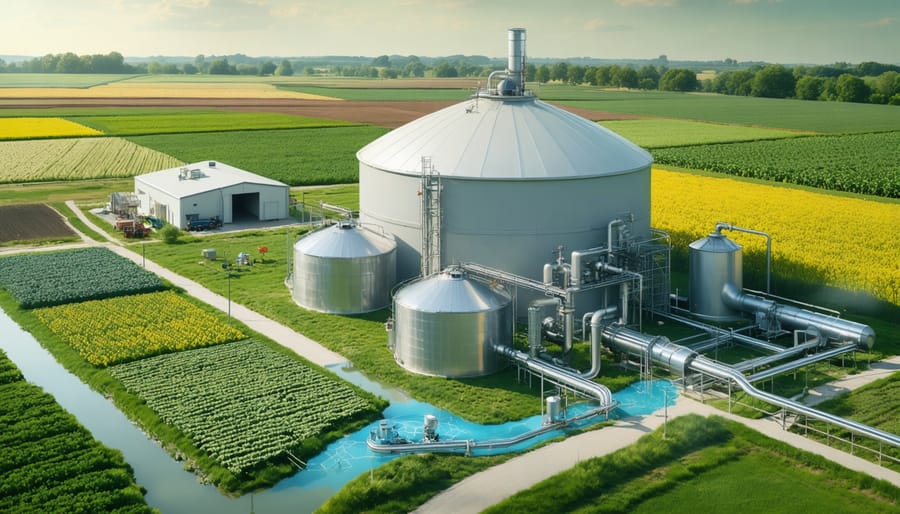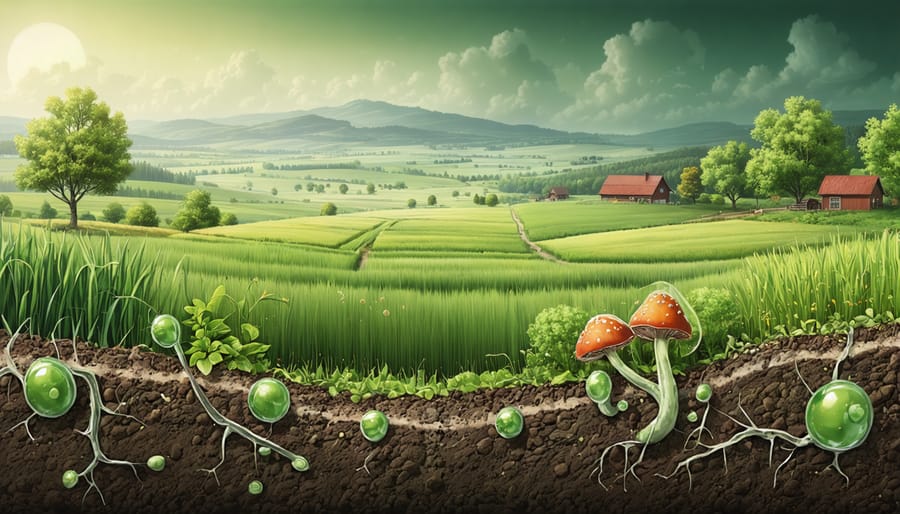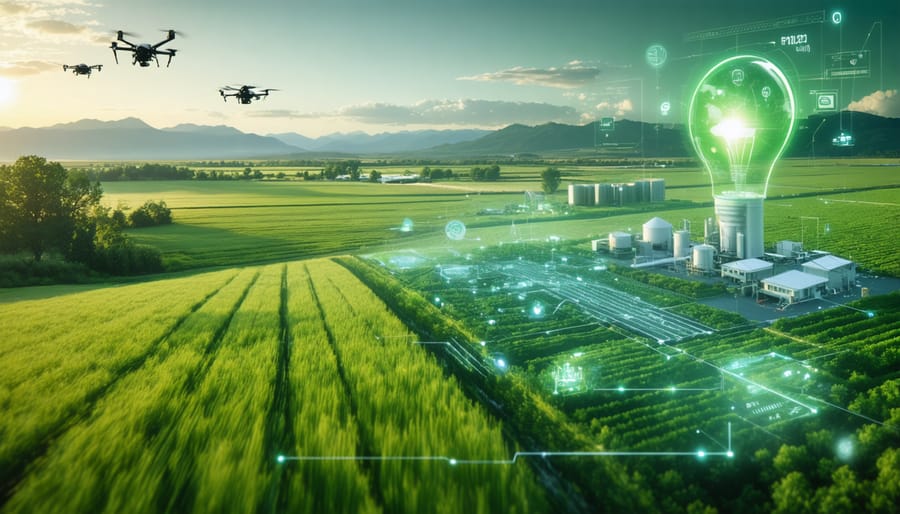Transform agricultural waste into valuable resources through emerging technologies that are revolutionizing Canadian farming operations. From converting corn stalks into biofuel to processing livestock manure into premium fertilizer, these innovations are driving a circular agricultural revolution across Alberta’s farmlands.
Modern agri-waste technology offers practical solutions that simultaneously reduce environmental impact and create new revenue streams. Advanced anaerobic digesters now process organic waste into biogas and nutrient-rich digestate, while precision composting systems transform crop residues into high-value soil amendments within weeks instead of months.
For Alberta farmers, implementing these technologies isn’t just environmentally responsible—it’s economically smart. Every tonne of agricultural waste processed through these systems represents potential income through biogas production, organic fertilizer sales, or carbon credit programs. With government incentives and growing market demand for sustainable agricultural practices, the transition to agri-waste technology has never been more timely or profitable.
The New Face of Agricultural Waste Management in Alberta
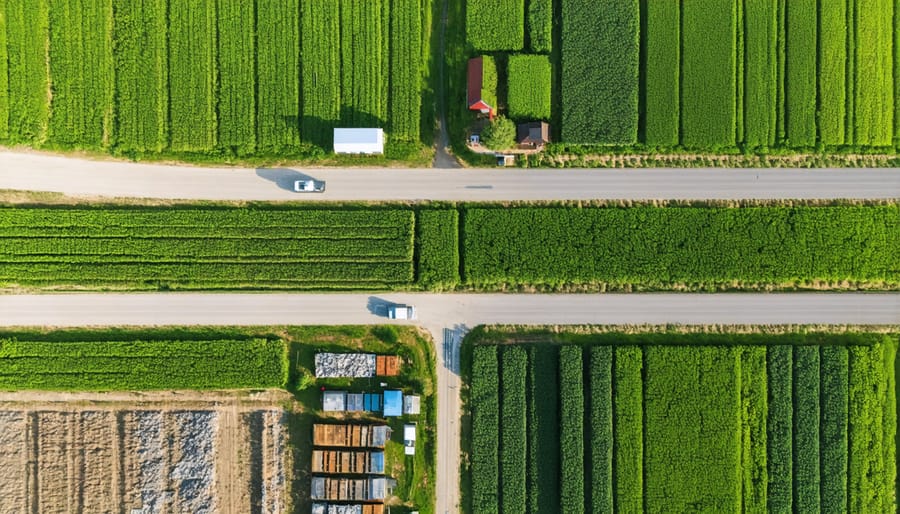
Mapping Alberta’s Agricultural Waste Streams
Alberta’s agricultural sector generates diverse waste streams that present significant opportunities for value-added processing. Crop residues, particularly from wheat and canola production, account for approximately 8 million tonnes annually across the province. These materials can be transformed into biofuels, animal bedding, and eco-friendly packaging materials.
Livestock operations produce about 20 million tonnes of manure yearly, which holds potential for biogas production and organic fertilizer development. The province’s dairy industry generates substantial volumes of whey and other processing by-products that can be refined into protein supplements and biochemicals.
In the Peace Region, pulse crop residues offer unique opportunities for extracting high-value proteins and fibers. Meanwhile, the greenhouse operations around Medicine Hat and Brooks produce plant waste suitable for composting and soil amendment products.
Recent surveys indicate that only 30% of Alberta farms currently implement structured waste management programs, suggesting significant room for growth in waste-to-value initiatives. Local success stories include several Lethbridge-area feedlots converting manure into renewable natural gas, and Red Deer County’s innovative straw-to-biocomposite processing facility.
Economic Benefits of Waste Upcycling
Alberta farmers are discovering innovative ways of transforming waste into profit, creating substantial economic advantages for their operations. By implementing agri-waste technology, farms can reduce disposal costs by up to 60% while generating new income streams from previously discarded materials.
Take the example of the Morrison Family Farm in Red Deer, which saved $12,000 annually in waste management fees by converting crop residue into biochar. Similarly, dairy operations across central Alberta are using anaerobic digesters to transform manure into biogas, cutting energy costs by an average of $25,000 per year while selling excess power back to the grid.
The initial investment in waste upcycling technology typically pays for itself within 2-3 growing seasons. Additional revenue opportunities include selling processed organic fertilizers, creating animal bedding from processed crop waste, and developing value-added products like mushroom growing medium. Government grants and carbon credits provide further financial incentives, making waste transformation an increasingly attractive option for forward-thinking Canadian farmers.
Game-Changing Technologies in Action
Biogas Generation Systems
Several Alberta farms have successfully implemented biogas energy production systems, demonstrating the viability of this technology in our climate. The Lethbridge Biogas facility, partnering with local dairy farms, processes over 120,000 tonnes of agricultural waste annually, generating enough electricity to power 2,800 homes while producing valuable organic fertilizer as a by-product.
In Red Deer County, the Hansen family farm installed a smaller-scale system that processes manure from their 200-head dairy operation. Their system generates 50 kilowatts of electricity daily, reducing their energy costs by 60% and providing heating for their barn facilities during winter months.
The Sundgaard operation near Olds represents another success story, where a mixed farming enterprise combines cattle manure with crop residues to fuel their biogas digester. Their system not only manages waste effectively but also produces enough energy to run their grain drying operations during harvest season.
These implementations have shown consistent returns on investment within 5-7 years, with additional benefits including reduced odour complaints from neighbors, decreased greenhouse gas emissions, and improved nutrient management. Local agricultural extension services offer support for farmers interested in exploring similar systems, with funding options available through Alberta’s Climate Smart Agriculture initiatives.
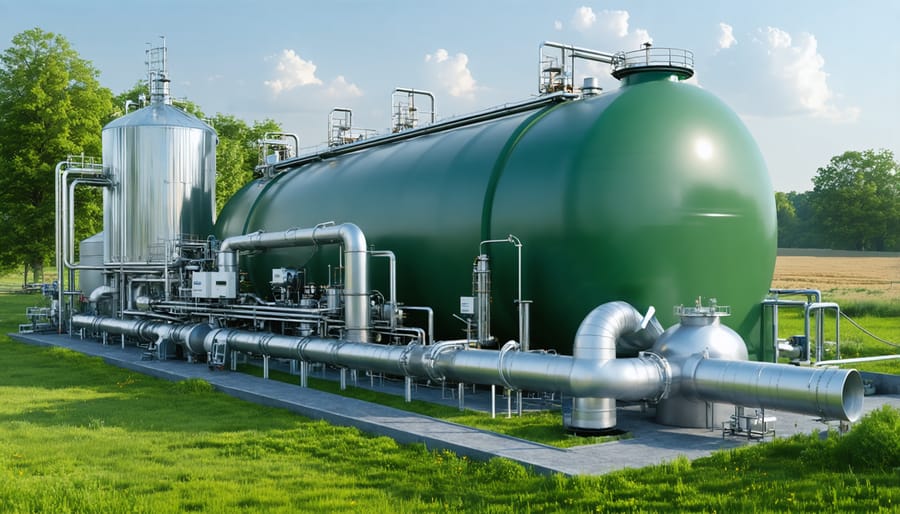
Advanced Composting Technologies
Today’s composting technologies have evolved far beyond traditional methods, offering Alberta farmers efficient solutions for converting agricultural waste into valuable soil amendments. Modern proven composting systems now incorporate temperature monitoring, automated turning mechanisms, and precise moisture control to optimize decomposition.
In-vessel composting systems, increasingly popular among mid-sized operations, can process up to 50 tonnes of material weekly while maintaining consistent conditions year-round – particularly valuable during our harsh prairie winters. These systems reduce composting time from months to weeks while minimizing odours and preventing nutrient loss.
Aerated static pile systems, equipped with temperature probes and forced-air delivery, have shown excellent results in the Peace River region, where farmers report 40% faster decomposition rates compared to traditional windrow methods. These systems require less land and labour while producing consistently high-quality compost.
The latest innovation in composting technology is the integration of smart sensors and mobile apps, allowing farmers to monitor and adjust conditions remotely. Local success stories include the Leduc County Collective, where five farms share a centralized composting facility using automated systems to process diverse agricultural wastes, from crop residues to livestock bedding, creating nutrient-rich amendments that have improved soil organic matter by 2.5% over three years.
Value-Added Products from Crop Residues
Agricultural residues are being transformed into an impressive array of value-added products across Alberta, creating new revenue streams for farmers while reducing environmental impact. From wheat straw to corn stalks, these materials are finding innovative uses beyond traditional applications.
Local processors are converting crop residues into eco-friendly packaging materials, replacing single-use plastics in everything from food containers to shipping materials. In Lethbridge, several farms are collaborating with manufacturers to turn canola stalks into biodegradable furniture components and building materials.
Biocomposite products are gaining traction, with flax and hemp residues being processed into automotive parts and construction materials. These materials offer comparable strength to traditional products while reducing the carbon footprint. Some Alberta farmers are also partnering with research facilities to develop high-value biochar from straw residues, which serves as both a soil amendment and carbon storage solution.
The paper and pulp industry has shown increasing interest in agricultural residues as an alternative to wood pulp. Several mills in central Alberta are now incorporating wheat straw into their production processes, creating premium paper products while reducing pressure on forest resources.
Perhaps most promising is the emergence of biochemicals derived from crop residues. These products range from natural adhesives to industrial enzymes, offering farmers new opportunities to participate in the growing bio-economy while maintaining sustainable farming practices.
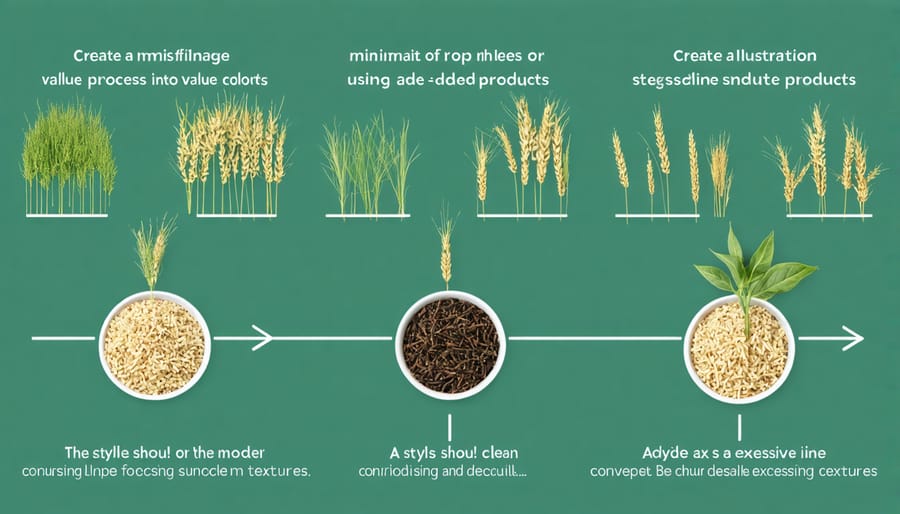
Implementation Guide for Alberta Farmers
Getting Started with Waste Upcycling
Starting your waste upcycling journey doesn’t have to be overwhelming. Begin by conducting a thorough waste audit of your farm operations to identify the types and volumes of agricultural waste you’re producing. Common waste streams in Alberta include crop residues, livestock manure, and damaged or unsold produce.
Next, assess your available resources, including storage space, equipment, and labour capacity. Consider starting small with a pilot project focusing on one waste stream. For example, many Alberta farmers begin with composting crop residues, which requires minimal initial investment and can be scaled up gradually.
Connect with local agricultural extension offices and waste management experts who can provide guidance specific to your region. The Alberta Farm Waste Management Program offers free consultations and can help identify potential funding opportunities for your waste upcycling initiatives.
Essential considerations for implementation include:
– Seasonal variations in waste production
– Storage requirements and containment solutions
– Processing equipment needs
– Labour and time management
– Local regulations and permits
– Market opportunities for upcycled products
Consider joining farmer-led waste management cooperatives in your area. These groups often share resources, knowledge, and equipment, making implementation more cost-effective. The Central Alberta Waste Management Alliance, for instance, has helped numerous farmers establish successful waste upcycling programs.
Start documenting your waste management processes from day one. This will help you track progress, identify areas for improvement, and demonstrate the value of your initiatives when applying for grants or certifications. Remember, successful waste upcycling is a journey of continuous improvement, so be prepared to adapt and refine your approach as you gain experience.
Available Support and Resources
Alberta farmers looking to implement agri-waste technology solutions have access to numerous support programs and funding opportunities. The Canadian Agricultural Partnership (CAP) offers grants of up to $100,000 for innovative waste management projects, with applications accepted year-round through the Alberta Agriculture and Forestry office.
The Environmental Stewardship and Climate Change Producer Program provides technical assistance and funding specifically for projects that reduce agricultural waste and improve environmental outcomes. Farmers can receive up to 70% of eligible costs for approved projects, including waste-to-energy systems and composting facilities.
Local agricultural fieldmen and extension offices throughout Alberta offer free consultations and can connect farmers with relevant experts and resources. The Alberta Biomaterials Development Centre in Vegreville provides testing facilities and technical expertise for farmers exploring new waste conversion technologies.
Several regional agricultural societies host regular workshops and training sessions on agri-waste management. The Agricultural Research and Extension Council of Alberta (ARECA) maintains a network of applied research associations that offer hands-on demonstrations and field trials of various waste management technologies.
Financial institutions like Farm Credit Canada and ATB Financial offer specialized lending programs for agricultural waste management projects, with competitive rates and flexible repayment terms. Additionally, the Alberta Environmental Farm Plan Company provides free environmental assessments and action planning support to help farmers identify waste management opportunities.
For guidance on available programs and application processes, farmers can contact their local Agricultural Service Board or visit the Alberta Agriculture and Forestry website’s funding portal.
Future-Proofing Your Farm with Agri-Waste Innovation
As we look to the future of agriculture in Alberta, innovative agri-waste technologies are emerging as game-changers for farm sustainability. Leading agricultural researchers at the University of Alberta predict that by 2030, farms implementing integrated waste management systems could reduce their environmental footprint by up to 40% while creating new revenue streams.
Smart sensors and IoT technology are revolutionizing how we monitor and manage agricultural waste. These systems can now track decomposition rates, nutrient levels, and optimal processing times, allowing farmers to maximize the value of their waste products. In Lethbridge, several early adopters are already using AI-powered waste sorting systems that automatically separate different types of agricultural residues for specific applications.
Emerging biotechnology solutions are also showing promise. Advanced anaerobic digestion systems are becoming more efficient and compact, making them viable options even for medium-sized farms. These systems can process a wider variety of waste materials while producing higher-quality biogas and fertilizers.
Looking ahead, carbon credit programs are expected to expand, offering additional incentives for farms that adopt waste-to-energy technologies. The Alberta Carbon Offset System is developing new protocols specifically for agricultural waste management, which could provide significant financial benefits for forward-thinking farmers.
To future-proof your operation, consider starting with a waste audit to identify potential opportunities. Connect with local agricultural extension services and join innovation networks to stay informed about emerging technologies and funding opportunities. Remember, today’s investment in agri-waste technology is tomorrow’s competitive advantage in an increasingly sustainability-focused market.
The path to sustainable agriculture lies in our ability to transform what was once considered waste into valuable resources. Throughout Alberta, innovative farmers are already leading the way, demonstrating that agri-waste technology isn’t just environmentally responsible – it’s economically smart. By implementing these solutions, you can reduce operational costs, create new revenue streams, and contribute to a more sustainable agricultural future.
Start small by conducting a waste audit of your operations and identifying areas where immediate improvements can be made. Consider connecting with local agricultural extension services or joining farmer-led initiatives that focus on waste management solutions. Remember, you don’t have to tackle this transformation alone – there’s a strong community of agricultural professionals ready to share their experiences and expertise.
The technology and support systems are in place – now is the time to take action. Whether it’s implementing anaerobic digestion, exploring composting solutions, or adopting precision farming techniques to minimize waste, every step counts. By embracing agri-waste technology today, you’re not just investing in your farm’s future; you’re helping build a more sustainable agricultural sector for all of Canada.
Contact your local agricultural representative to learn more about available resources and funding opportunities for implementing waste management solutions on your farm.

